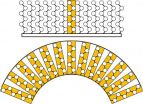Scientists pinpoint gene linked to drug resistance in malaria
Scientists have shed light on how malaria is able to resist treatment with a leading drug
2010-10-13
(Press-News.org) Scientists have shed light on how malaria is able to resist treatment with a leading drug.
Researchers have identified a gene that enables the parasite that causes the infection to resist treatment with the plant-based remedy artemisinin.
In many countries where the parasite has developed resistance to previously effective common treatments such as chloroquine, artemisinin remains the only effective treatment against the infection. However, malarial resistance to artemisinin appears to be developing, potentially creating problems in controlling malaria.
Identification of this gene paves the way for further studies that could eventually help control the development of resistance to artemisinin and lead to more effective drugs for human malaria.
The study, by scientists from the University of Edinburgh and the Universidade Nova de Lisboa, used emerging technology to scan the genetic fingerprint of drug resistant parasites that infect rodents. This technology allows rapid identification of genes that enable the parasite to withstand existing drug treatments.
There are estimated to be between 300 and 500 million cases of malaria each year, occurring in over 90 different countries, according to the World Health Organisation.
Dr Paul Hunt, from the University of Edinburgh's School of Biological Sciences, said: "This knowledge from rodent malaria parasites opens up new directions that will allow this gene to be investigated in human malaria. This may help track the evolution of drug resistance and may eventually enable the design of alternative, effective drugs."
###
The study, published in BMC Genomics, was funded by the Medical Research Council.
END
ELSE PRESS RELEASES FROM THIS DATE:
2010-10-13
EAST LANSING, Mich. — Despite an international effort to raise awareness about epilepsy in resource-poor nations, a recently published study found nearly 50 percent of pharmacies in Zambia do not carry antiepileptic drugs, seriously hampering efforts to tackle one of the most cost-effective chronic conditions to treat.
The study, recently published in the American Journal of Tropical Medicine and Hygiene, was led by Gretchen Birbeck, an associate professor of neurology and ophthalmology and director for the International Neurologic & Psychiatric Epidemiology Program in ...
2010-10-13
ALBUQUERQUE, N.M.— It may seem obvious that dunking relatively spherical objects in a sauce — blueberries in melted chocolate, say — will result in an array of completely encapsulated berries.
Relying on that concept, fabricators of spherical nanoparticles have similarly dunked their wares in protective coatings in the belief such encapsulations would prevent clumping and unwanted chemical interactions with solvents.
Unfortunately, reactions in the nanoworld are not logical extensions of the macroworld, Sandia National Laboratories researchers Matthew Lane and Gary ...
2010-10-13
Many young people with mental health problems are at risk of falling through a huge gap in provision when they move from adolescent to adult care services, according to new research from the University of Warwick.
A team led by Professor Swaran Singh at Warwick Medical School looked at the transition from child mental health services to adult mental health services and found for the vast majority of users the move was "poorly planned, poorly executed and poorly experienced".
In a study published in The British Journal of Psychiatry, the research team looked at 154 service ...
2010-10-13
Donor kidneys can be successfully transplanted even if there is strong tissue incompatibility between donor and recipient. An interdisciplinary working group headed by Dr. Christian Morath, senior consultant at the Department of Nephrology at Heidelberg University Hospital (Medical Director: Professor Dr. Martin Zeier) and Professor Dr. Caner Süsal, head of antibody laboratory in the Department of Transplantation Immunology, showed in a study of 34 sensitized high-risk patients that the success rate in these patients was not different from the success rate of patients with ...
2010-10-13
MADISON — The mathematical skills of boys and girls, as well as men and women, are substantially equal, according to a new examination of existing studies in the current online edition of journal Psychological Bulletin.
One portion of the new study looked systematically at 242 articles that assessed the math skills of 1,286,350 people, says chief author Janet Hyde, a professor of psychology and women's studies at the University of Wisconsin-Madison.
These studies, all published in English between 1990 and 2007, looked at people from grade school to college and beyond. ...
2010-10-13
(CHICAGO)–In a study to determine the durability and long-term effects of transcranial magnetic stimulation (TMS), psychiatric researchers at Rush University Medical Center have found the non-invasive, non-drug therapy to be an effective, long-term treatment for major depression. Results of the study were published in the October 2010 issue of Brain Stimulation, a journal published by Elsevier.
TMS therapy is a non-invasive technique that delivers highly focused magnetic field pulses to a specific portion of the brain, the left prefrontal cortex, in order to stimulate ...
2010-10-13
European researchers have proven for the first time that targeting the epidermal growth factor receptor can provide substantial clinical benefit for women with hard-to-treat triple-negative breast cancer.
At the 35th Congress of the European Society for Medical Oncology (ESMO) in Milan, Italy, the researchers presented results from a Phase-II randomized trial showing that adding the anti-EGFR antibody cetuximab to cisplatin chemotherapy doubled the response rate and time to progression when compared to cisplatin chemotherapy given alone in a study of 173 heavily pre-treated ...
2010-10-13
ANN ARBOR, Mich. – University of Michigan scientists have identified events inside insulin-producing pancreatic cells that set the stage for a neonatal form of non-autoimmune type 1 diabetes, and may play a role in type 2 diabetes as well. The results point to a potential target for drugs to protect normally functioning proteins essential for producing insulin.
A study published online today in the journal PLoS One shows that certain insulin gene mutations involved in neonatal diabetes cause a portion of the proinsulin proteins in the pancreas' beta cells to misfold. ...
2010-10-13
October 10, 2010─(BRONX, NY) ─Two major international studies looking at data from a quarter of a million people around the globe have found a new set of genes associated with body fat distribution and obesity. Researchers at 280 institutions worldwide, including Albert Einstein College of Medicine of Yeshiva University, conducted the studies. The research, published in the October 10 online edition of Nature Genetics, sheds light on the biological processes involved in body fat distribution, possibly leading to new ways of treating obesity.
"These studies ...
2010-10-13
Los Angeles, CA (October 11, 2010) NFL players with concussions now stay away from the game significantly longer than they did in the late 1990s and early 2000s, according to research in Sports Health (owned by American Orthopaedic Society for Sports Medicine and published by SAGE). The mean days lost with concussion increased from 1.92 days during 1996-2001 to 4.73 days during 2002-2007.
In an effort to discover whether concussion injury occurrence and treatment had changed, researchers compared those two consecutive six-year periods to determine the circumstances of ...
LAST 30 PRESS RELEASES:
[Press-News.org] Scientists pinpoint gene linked to drug resistance in malaria
Scientists have shed light on how malaria is able to resist treatment with a leading drug

